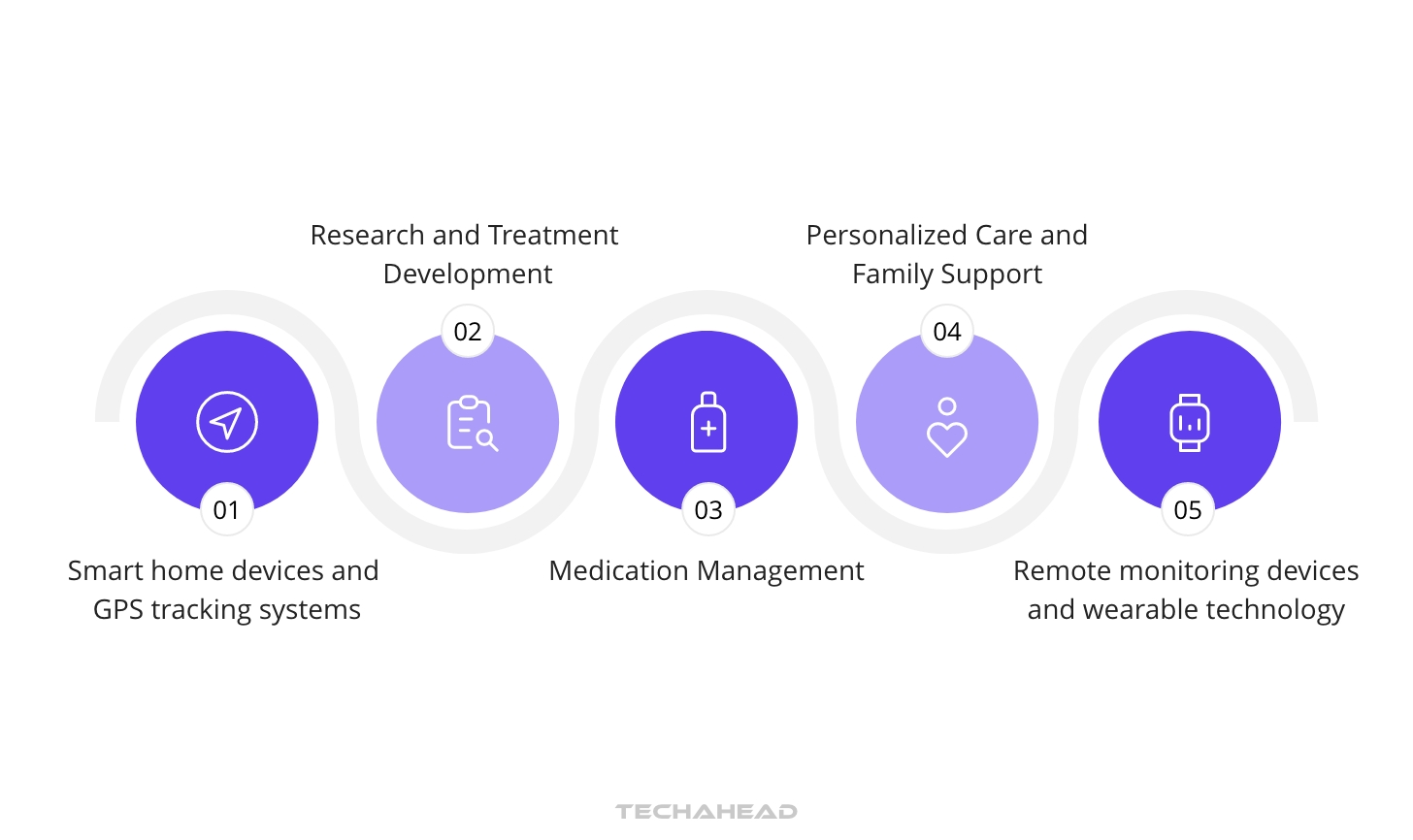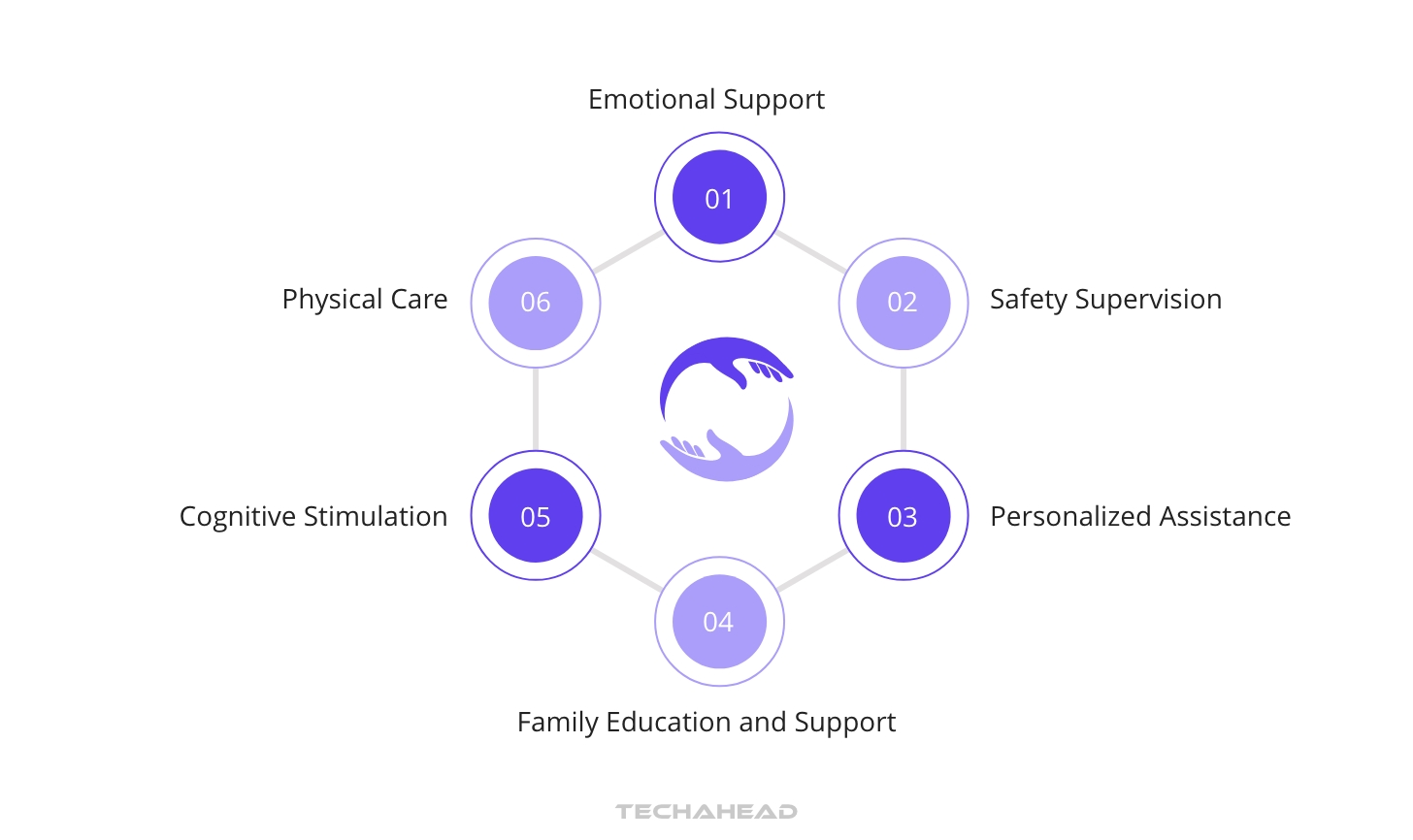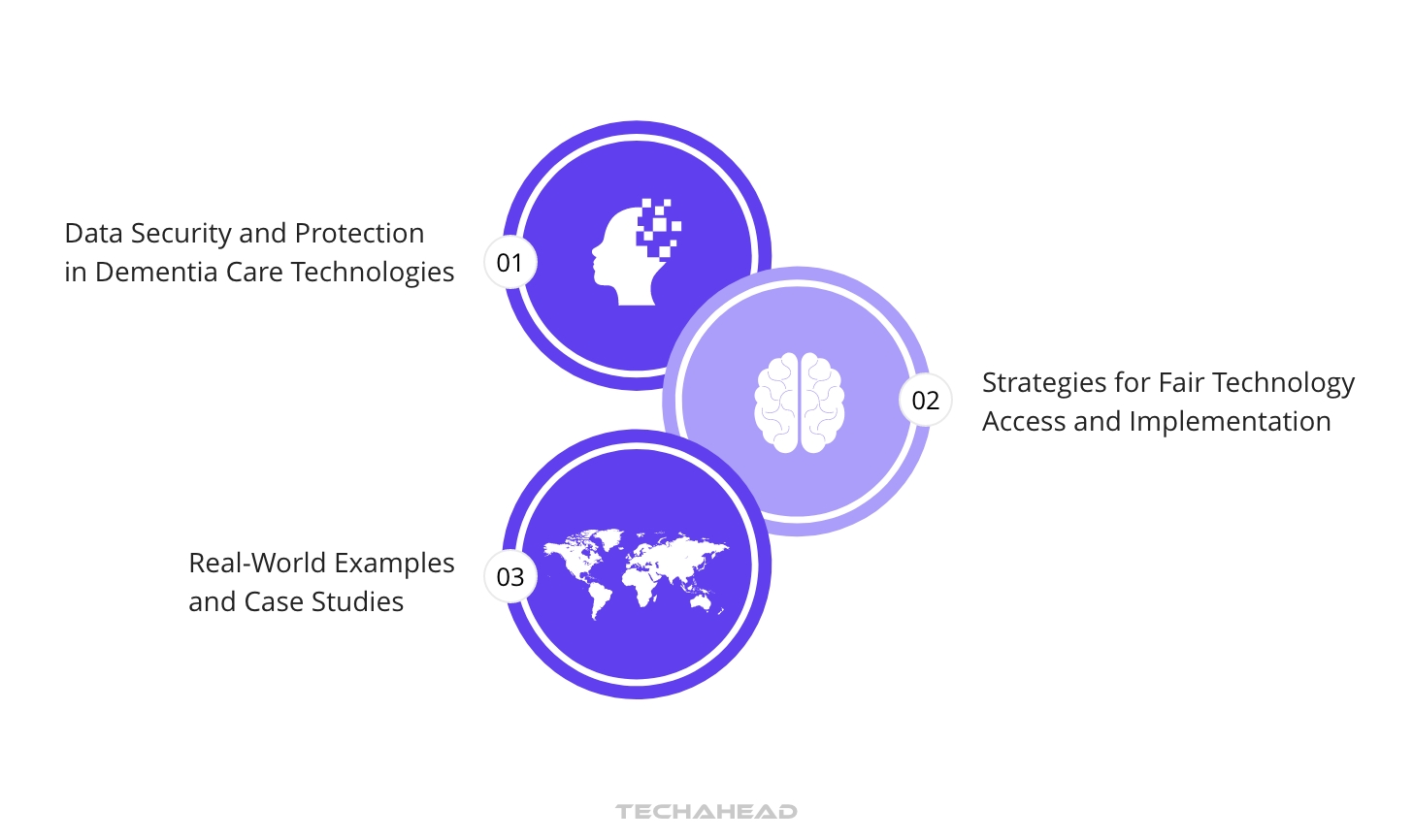
When caring for individuals with Alzheimer’s, how do we strike a balance between the exciting possibilities of healthcare apps and the irreplaceable value of human connection? This article dives into ethical considerations in Alzheimer’s care, balancing technological advancements with human connection and scrutinizing how we can leverage advancements like intelligent assistive technologies in healthcare apps without allowing them to overshadow the irreplaceable value of the human touch. We’ll explore informed consent, privacy protection, and fair access, ensuring technology serves as a complement to, not a replacement for, the nuanced care that defines our humanity.
Key Takeaways
- Ethical principles such as informed consent, privacy, autonomy, and fair technology access must guide the use of intelligent assistive technologies in Alzheimer’s care to ensure respectful and appropriate support for individuals with dementia.
- While technological advancements play a critical role in enhancing Alzheimer’s care, maintaining human connection is paramount, as human-centered care is essential for the emotional support and well-being of those affected by the condition.
- Data security and patient confidentiality are crucial in dementia care technologies, requiring strong regulatory frameworks and privacy-oriented design to protect the sensitive nature of personal health information.
The Ethical Landscape of Assistive Technology in Alzheimer’s Care
The evolution of assistive technology and the use of mobile apps in healthcare brings with it a host of ethical considerations that must be carefully navigated. Ethical principles emphasizing respect, flexibility, and trustworthiness are paramount when integrating healthcare apps into dementia care. The intersection between digital technologies and caregiving reveals complex ethical issues that require meticulous attention from both technology developers and professional caregivers to ensure the responsible introduction of novel tools in caring for individuals.
Within this domain, certain core ethical concerns, such as informed consent, privacy, autonomy, and equitable access to technology, warrant special consideration. As we embrace intelligent assistive technologies along with other advanced digital aids designed for assistance purposes—even though they hold great potential—they necessitate rigorous processes for making ethically sound decisions that honor the rights and preferences of those suffering from cognitive impairments.
It falls upon professional caregivers teamed with technological specialists to navigate these ethical quandaries meticulously, ensuring that any incorporation or advancement in existing technologies reinforces rather than diminishes human-centric care practices. Research related to evolving technology stands at the forefront here. It’s vital to pave the way forward while upholding established ethical standards within supportive environments tailored specifically toward supporting dementia care.
Informed Consent
Navigating the complexities of informed consent within the context of Alzheimer’s disease requires a nuanced approach that accommodates the fluctuating capacities of those with cognitive impairment. The concept of informed consent, while straightforward in theory, becomes labyrinthine when applied to participants with dementia, whose ability to fully comprehend and agree to the use of assistive technologies may be compromised.
Healthcare professionals and researchers need to explore alternative methods, like clear, simplified information and supported decision-making frameworks, to respect the ethical guidelines on patient autonomy. The ethical implications of seeking informed consent from this vulnerable population extend beyond moral obligation; they represent a systematic review of how consent is understood and honored in the face of cognitive decline.
Privacy and Autonomy
Integrating intelligent assistive technologies in dementia care brings to the forefront ethical considerations involving personal privacy and independence. Surveillance technologies, in particular, compel us to consider how much supervision and control over one’s environment is appropriate. It is essential that we scrutinize the ethical aspects associated with implementing such monitoring devices so as not to infringe on the private lives of older adults.
While surveillance technology aims to bolster security, it may inadvertently diminish the feeling of self-sufficiency, which is vital for those living with dementia. To ensure these tools aid in support of dementia care effectively, they must be governed by ethical guidelines that preserve their ability to enjoy freedoms and personal space integral to maintaining autonomy.
Balancing Technological Advancements with Human Connection

As we embrace the benefits that technological advances bring to Alzheimer’s care, it is critical not to lose sight of the fact that caregiving fundamentally hinges on human interaction. Smart home systems and virtual reality are examples of intelligent assistive technologies with the capability to enhance support in dementia care. Nevertheless, their usage should be guided by an appreciation for their role as supplements rather than substitutes for personal caregiving.
When embedding digital technologies into caregiving practices, we must carefully navigate ethical challenges so they do not diminish the vital importance of human contact—a key element providing emotional sustenance and contributing to the well-being of individuals living with dementia. The most effective approach towards healthcare innovation marries technological progress with humane attention, cultivating a treatment environment marked by both advanced capabilities and deep compassion.
The Role of Human Care

In the realm of dementia care, the significance of human connection is paramount. The World Health Organization along with other prominent health authorities highlight our moral obligation to prioritize compassionate and person-focused care as a core component in any treatment strategy. It falls upon healthcare professionals and those managing nursing homes to ensure that assistive technology augments, rather than diminishes, the vital human interaction.
It’s crucial for professional caregivers to foster an atmosphere where technology acts as an aid that bolsters care provision instead of supplanting the unique emotional support and well-being provided by human contact. Thus, maintaining a direct personal engagement remains fundamental in ensuring dignified attention for individuals living with dementia.
Risks of Overreliance on Technology

The seductive allure of innovative technologies must be tempered with caution, as the risks of overreliance on digital tools in dementia care are significant. An overemphasis on technological solutions can lead to a diminishing of human contact, potentially leaving patients feeling isolated or neglected. It is a delicate balance to maintain—leveraging the benefits of assistive technology while guarding against the erosion of the human connection that is so vital for those living with dementia.
Technology experts and developers must bear in mind that direct human interaction and care shouldn’t be replaced by a false sense of security or convenience as they proceed with technological developments. The role of technology in dementia care should be as a bridge, not a barrier, to human connection and support.
Data Security and Protection in Dementia Care Technologies
In the realm of digital healthcare, the importance of data security and protection is magnified when dealing with technologies related to dementia care. Given that personal health information for those affected by dementia is especially sensitive, it’s crucial to implement rigorous safeguards to prevent unauthorized access and preserve patient privacy. Aligning ethical considerations around data security with human rights legislation is essential in protecting both the rights and privacy of individuals living with dementia.
Delving into the complexities surrounding data protection underscores the need for strong regulatory frameworks and policies tailored specifically towards users of dementia technology. Such comprehensive protections require a collaborative approach involving not just policy makers but also professional caregivers and developers within the tech industry dedicated to serving this vulnerable population.
Ensuring Data Privacy
Strategies like privacy-by-design frameworks are crucial to protect the privacy of dementia patients in a time when digital technologies are omnipresent. Some key strategies to consider include:
- Implementing strong privacy settings
- Using transparent handling processes to protect sensitive information
- Ensuring data security is a foundational element of assistive technology
By following these strategies, you can help safeguard the privacy of dementia patients in the digital age.
The principle of data parsimony, which advocates for collecting only the data that is strictly necessary, must be adhered to, along with giving patients and caregivers the right to control their own data. Interoperability and secure data exchanges will be crucial in maintaining data privacy as various technologies integrate into the fabric of dementia care.
Regulatory Frameworks and Policies
Effective data protection in technologies utilized for dementia care hinges on the implementation of robust regulatory structures and well-defined policies. This is illustrated by the Privacy Policy adopted by the Alzheimer’s Association, which seeks to align with worldwide data protection norms and tackle existing shortcomings regarding user control over their personal information.
Risk management strategies concerning data security need to encompass both third-party data sharing practices and compliance with legal requirements about consent and resolving disputes. Global accords like the United Nations Convention on the Rights of Persons with Disabilities underscore a commitment to safeguarding the privacy rights of those affected by dementia across various environments.
Strategies for Fair Technology Access and Implementation
To realize distributive justice in the deployment of assistive technologies within dementia care, it is essential to engage in careful strategic planning and embrace inclusive design. Addressing both the high expenses involved and the risk for social inequity regarding technology access necessitates devising plans that advocate for fair distribution and confirm support is accessible to every individual with dementia.
Crafting these strategies requires input from stakeholders who acknowledge the extensive range of assistance people with dementia need—from fundamental daily activities to intricate care coordination tasks. Ensuring fair access to technology and its application transcends mere technical issues. It embodies moral obligations requiring deliberate reflection and decisive measures.
Design Frameworks
Frameworks for design, such as Value Sensitive Design (VSD), serve as a guideline to integrate ethical considerations within the fabric of technology development tailored for dementia care. By focusing on user-centered and participatory methods, developers are better positioned to create new technologies that are not just efficient but also finely tuned to the unique requirements of individuals affected by dementia.
It is imperative that designers and engineers receive training regarding the values and necessities specific to this group in order to optimize the utility of assistive technologies for their intended end users. Ensuring transparent procedures around data security Reinforces these frameworks’ commitment toward safeguarding patient information—a crucial aspect underpinning both trust and efficacy in technological advancements dedicated to assistance with dementia care.
Education and Awareness
Educating caregivers and family members on the intricacies of assistive technology is essential for its ethical and effective use in dementia care. It’s vital to cultivate an understanding of issues surrounding data privacy as well as the significance of obtaining informed consent from those who work closely with both dementia patients and their technologies.
Resources designed to educate can help guide those caring for individuals with dementia on how best to interact with assistive technologies, thereby avoiding improper usage while maximizing the potential benefits they offer. With greater awareness, caregivers are equipped to:
- Comprehend appropriate application and limitations of assistive tools
- Champion responsible and moral employment of technology within dementia caregiving contexts
- Aid people living with dementia in making efficient use of these technological aids
Empowering caregivers through access to pertinent knowledge and materials improves overall quality in support systems catering specifically for individuals living with dementia.
Real-World Examples and Case Studies
Case studies and practical applications illuminate the theoretical debates surrounding assistive technologies within dementia care, emphasizing their possible advantages as well as the obstacles they present. Smart home technology, for example, has proven effective in providing objective assessments that enhance everyday living activities for those experiencing mild cognitive impairment.
Technologies such as ambient system-based solutions aimed at restricting nocturnal wanderings have shown how technological advances can improve safety and life quality for people with dementia. Systems designed to monitor individuals at home may provide healthcare professionals insight into patient conditions and needs, pointing toward a future where care is more cohesive.
For caregivers of Alzheimer’s patients, e-learning platforms have become essential tools for improving well-being by mitigating symptoms of depression—this emphasizes educational support’s critical role in managing dementia care. Smart sensors offer promising improvements in both caregiving standards and efficiency, which benefits caregivers alongside recipients of care.
Utilizing an array of different technologies has been studied to bolster independence and self-reliance among those dealing with cognitive challenges. Technologies enhancing autonomy include:
- Non-invasive alarms based on user location
- Applications set up to send timely reminders
- Devices enabling GPS localization
- Intelligent domestic appliances
- Systems geared toward efficient medication administration
Growing confidence in using these technologies along with increased proficiency reinforces their ability not only to facilitate positive changes but also enrich the lives of individuals affected by dementia.
Summary
In the intricate dance between technological innovation and the enduring need for human connection, we find the future of Alzheimer’s care. This exploration has traversed the ethical landscapes of assistive technology, underscored the importance of human care, and examined the challenges of data security and fair technology access. The case studies presented serve as beacons, illuminating the path to a care paradigm that respects both the human spirit and the promise of technology.
As we stand at the crossroads of empathy and innovation, let us carry forward the insights gleaned from these discussions, championing the cause of ethical and compassionate dementia care. May we cultivate a future where technology enriches the lives of those with Alzheimer’s while never eclipsing the warmth of human touch that lights the way through the fog of cognitive decline.
Frequently Asked Questions
What ethical considerations are there with the advancement of technology?
Technological progress brings forth various ethical considerations, including issues like bias in algorithms, privacy concerns regarding personal data, the deployment of autonomous systems and vehicles, the ethics surrounding genetic modification technologies, as well as the influence social media holds over society. There are significant ethical implications associated with Big Data usage.
It is imperative that these matters are thoughtfully contemplated and effectively dealt with.
What are the ethical consideration when using technology in health care?
It’s crucial to tackle ethical concerns such as informed consent, safety, transparency, biases in algorithms, and the protection of data privacy while employing technology in healthcare. This is necessary to realize fully the benefits that AI can bring to this field.
What are the ethical issues of Alzheimer’s disease?
In settings for dementia care, caregivers are routinely faced with the task of making ethical choices that encompass issues such as maintaining patient confidentiality, guarding against possible abuse, and weighing medication risks. All this is done in an environment where they must consider the requirements of several residents or clients simultaneously.
How can we ensure informed consent from individuals with dementia?
In securing informed consent from those with dementia, it is crucial to deliver information that is easy to understand and concise, take into account varying levels of capacity, enlist the help of proxy consent if required, and employ strategies such as advance directives and careful observation of behavior to respect the preferences of the individual.
What strategies can safeguard the privacy of dementia patients when using assistive technologies?
In protecting the confidentiality of dementia patients utilizing assistive technologies, it is crucial to adopt strategies like privacy-by-design approaches, adherence to data parsimony principles, robust privacy configurations, clear data management procedures and empowering users with governance over their personal information.
By taking these steps, one can ensure that the delicate details associated with dementia patients are shielded effectively.







